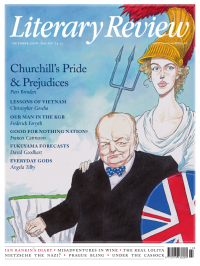Gavin Esler
Home of the Hamburger?
Inventing American Tradition: From the 'Mayflower' to Cinco de Mayo
By Jack David Eller
Reaktion Books 341pp £25
Canterbury Cathedral reeks of tradition. The home of the Church of England and Anglicanism, it may have a 21st-century Twitter handle, @No1Cathedral, but behind that lies more than a thousand years of history. When I was asked to become chancellor of the University of Kent, based in Canterbury, I was, I admit, daunted by the weight of tradition. One tradition, dating from the university’s founding in 1965, is for the chancellor to wear a heavy green silk and gold-braided gown created for the first person to exercise that office, Princess Marina. I was worried about how I would control the awkwardly flapping cloth and matching headgear as I processed into No1 Cathedral for the first time in front of a congregation of a thousand people to present degrees to graduating students. ‘What if the mortar board slips off?’ I said to the vice-chancellor, Dame Julia Goodfellow, ‘or if I trip on the gown and fall flat on my face?’ ‘Don’t worry,’ she assured me. ‘Anything that goes wrong in the cathedral, you just say it’s a tradition.’
She was right, of course. Traditions are inventions. Sometimes, as with the wearing of the kilt in Scotland (a part of my childhood), they fade away, although now kilt-wearing is back in favour. In other cases – for instance, eating ‘traditional’ Italian pasta with tomato sauce – traditions said to be ‘authentic’ turn out to be anything but. Tomatoes did not exist in Europe until Europeans discovered tomato plants in the Americas after 1492. Pasta came to Italy from noodles, discovered in China. Tastes and traditions change.
In his highly entertaining Inventing American Tradition, the anthropologist Jack David Eller illuminates with gentle wit and scepticism the many myths, legends and traditions that have grown up in the United States. Beginning with Jean Cocteau’s observation that ‘legends are lies which become history in the end’, Eller

Sign Up to our newsletter
Receive free articles, highlights from the archive, news, details of prizes, and much more.@Lit_Review
Follow Literary Review on Twitter
Twitter Feed
Margaret Atwood has become a cultural weathervane, blamed for predicting dystopia and celebrated for resisting it. Yet her ‘memoir of sorts’ reveals a more complicated, playful figure.
@sophieolive introduces us to a young Peggy.
Sophie Oliver - Ms Fixit’s Characteristics
Sophie Oliver: Ms Fixit’s Characteristics - Book of Lives: A Memoir of Sorts by Margaret Atwood
literaryreview.co.uk
For a writer so ubiquitous, George Orwell remains curiously elusive. His voice is lost, his image scarce; all that survives is the prose, and the interpretations built upon it.
@Dorianlynskey wonders what is to be done.
Dorian Lynskey - Doublethink & Doubt
Dorian Lynskey: Doublethink & Doubt - Orwell: 2+2=5 by Raoul Peck (dir); George Orwell: Life and Legacy by Robert Colls
literaryreview.co.uk
The court of Henry VIII is easy to envision thanks to Hans Holbein the Younger’s portraits: the bearded king, Anne of Cleves in red and gold, Thomas Cromwell demure in black.
Peter Marshall paints a picture of the artist himself.
Peter Marshall - Varnish & Virtue
Peter Marshall: Varnish & Virtue - Holbein: Renaissance Master by Elizabeth Goldring
literaryreview.co.uk